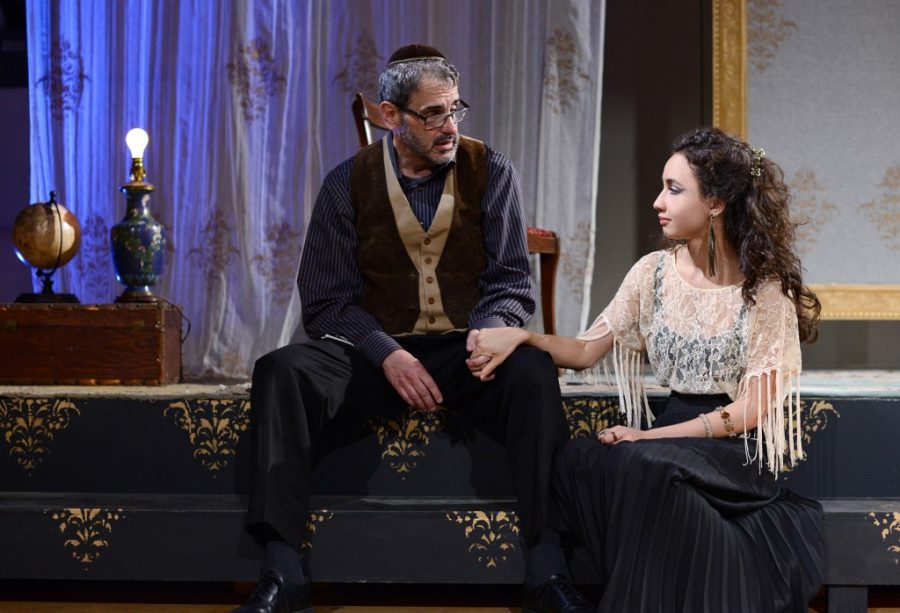
 Shakespeare’s most fascinating and troubling character, Shylock the money lender, has returned to haunt the stage once again in "The Merchant of Venice", presented by The Shakespeare Forum, a group of talented New York artists dedicated to exploring the works of England’s greatest playwright.
Shakespeare’s most fascinating and troubling character, Shylock the money lender, has returned to haunt the stage once again in "The Merchant of Venice", presented by The Shakespeare Forum, a group of talented New York artists dedicated to exploring the works of England’s greatest playwright.
The play presents difficulties for contemporary audiences, not the least of which is a villain that some see as a grotesque anti-Semitic stereotype. Yet directors Andrew Borthwick-Leslie and Sybille Bruun chose the right plan of attack. Knowing that to tread lightly on the play’s riskier areas would dilute it, they held nothing back. They played all of the play’s conflicts for all their worth, like a Greek tragedy. The actors laid bare all of their characters’ prejudices, treachery and emotional righteousness. If anyone in the audience wanted to choose sides, they could find both villainy and justified rage in Shylock as well as within the Christians he hates so bitterly.
As in many American productions of Shakespeare’s plays, the first half was uneven. But the play roared back to life after the intermission and each scene grew in dramatic power until the final climactic court scene in which Shylock arrived before a judge to claim, with legal justification, a gruesome “payment” for his loan. The audience was absolutely hooked.
Antonio, the merchant of the play’s title as well as the object of Shylock’s hatred, was sensitively and powerfully played by Dominic Comperatore. As he fell into ruin and doom, Comperatore’s Antonio maintained a level of composure that was very moving. As the play ended, the dust settling around him, Antonio remained alone onstage as the lights dimmed, perhaps the only Christian that was still troubled by what had just happened. It was a striking final image.
As Shylock, Joseph J. Menino was gripping, menacing, and yes, sympathetic. His was a fascinatingly naturalistic Shylock. He looked sometimes as ordinary as fellow you’d see in the street; at other times he was a lion roaring his thirst for revenge and crying out over the loss of his daughter. During the play’s climax he was utterly riveting. One shifted from empathizing with his pain to vilifying him for his bloodlust and his stubborn adherence to the letter of the law even when it invokes madness.
As Portia, Hannah Rose Goalstone was delightful, but it was her famous scene in which she appeared disguised as a judge that was the most powerful. It is a tribute to her and the entire production that when she boldly moved toward Shylock and said, “The quality of mercy is not strained,” a chill went up my back. As Nerissa, Sarah Hankins was both funny and touching; her romance with Gratiano (Michael Moreno) was quite endearing.
 The audience fell in love with Francis Mateo as Launcelot, the clown who, it must be said, made a memorable appearance. Having just been onstage as the King of Morocco, Mateo returned dressed in a different costume, ran up to an audience member, grabbed her program and hurriedly perused it to see who he was supposed to be playing next. This kind of interaction with the audience is quite Shakespearean, and it almost always adds to the magic of his plays.
The audience fell in love with Francis Mateo as Launcelot, the clown who, it must be said, made a memorable appearance. Having just been onstage as the King of Morocco, Mateo returned dressed in a different costume, ran up to an audience member, grabbed her program and hurriedly perused it to see who he was supposed to be playing next. This kind of interaction with the audience is quite Shakespearean, and it almost always adds to the magic of his plays.
The costume design was a bit bizarre. It was sometimes effective, as with Shylock’s simple yet defining wardrobe, but other times it was odd; some of Bassanio’s crew looked fresh out of Memphis. However, the lovely set and lighting design by Marie Yokoyama was very refreshing. Not quite minimalist, yet simple and elegant.
The production also included Bill Coyne as Bassanio, Imani Jade Powers as Jessica and Lash Dooly as Salanio (and on guitar). John Smiley was effective in multiple roles. "The Merchant of Venice" is always a bold choice for a company, and this presentation was one of the best American productions of Shakespeare I have seen in years. The Shakespeare Forum shows that on this side of the Atlantic, England’s treasure is in good hands.
Performances run through June 14th at the Gym at Judson.